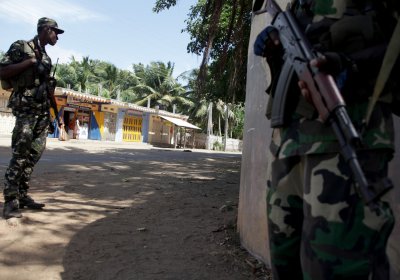The United Nations Human Rights Council has unanimously adopted a resolution called “Promoting Reconciliation, Accountability and Human Rights in Sri Lanka”.
This resolution, of which the United States was the main sponsor, welcomed a proposal by the Sri Lankan government to establish a “judicial mechanism” to investigate “abuses of human rights and violations of international humanitarian law”.
Liberation Tigers of Tamil Eelam (LTTE)
Sri Lankan President Maithripala Sirisena has dissolved parliament and called elections for August 17. Sirisena was elected president on January 9, replacing Mahinda Rajapaksa.
This speech was given at the Refugee Action Collective protest in Melbourne on April 8.
More than 500 people attended a dinner of the Australian Tamil Congress (ATC) on February 4.
The ATC, formed in 2009, campaigns for the rights of Tamil people in Sri Lanka, who have been subject to discrimination, oppression and massacres at the hands of successive racist Sri Lankan governments since the independence of Sri Lanka in 1948.
Men in uniform, mainly young soldiers holding AK 47 rifles, are seen all around northern Sri Lanka, from Mannar in north-west to Mullaitivu, the last battlefield in the north-east. In Mullaitivu, there are said to be more soldiers than civilians.
United Nations Secretary-General Ban Ki-moon announced on June 22 the formation of a three-member panel to advise him on whether Sri Lanka committed crimes during the last months of its war against the Liberation Tigers of Tamil Eelam, Reuters said that day.
More than a year after its victory over the pro-independence Liberation Tigers of Tamil Eelam (LTTE), the Sri Lankan Army (SLA) continues to hold large areas of land in the predominantly Tamil north and east of Sri Lanka as “high security zones” (HSZ).
Many of the Tamil inhabitants who were evicted from these areas to create the HSZs during the decades-long war are still unable to return to their homes.
Hundreds of Tamils turned out in Sydney’s Martin Place on May 18 to mark the first anniversary of the Sri Lankan army’s capture of the last bit of land held by the pro-independence Liberation Tigers of Tamil Eelam in the north-east of the country.
In driving rain, families lined up to place petals in front of a statue of a grieving mother. They heard from community speakers, the Greens, the Council for Civil Liberties (CCL) and the Socialist Alliance.
A May 17 International Crisis Group report said there were “reasonable grounds to believe the Sri Lankan security forces committed war crimes with top government and military leaders potentially responsible” in the last five months of the 30 year long war against Tamil independence fighters. The report cited the intentional shelling of civilians, hospitals and humanitarian operations.
- Previous page
- Page 2







